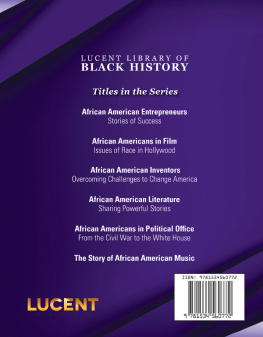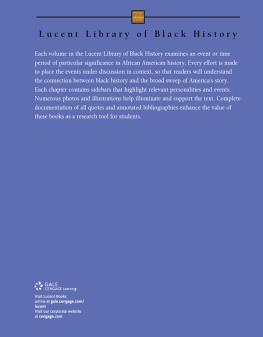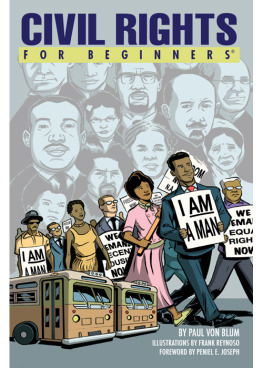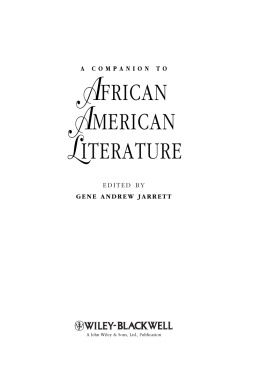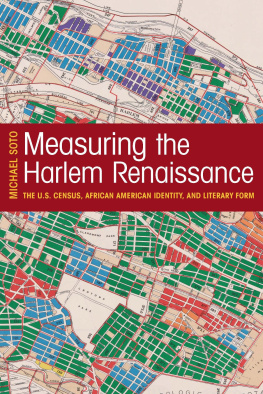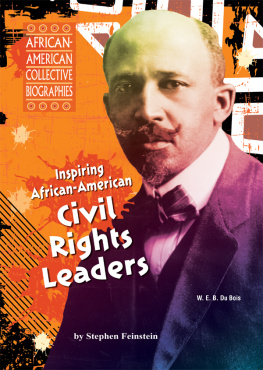

2011 Gale, Cengage Learning
ALL RIGHTS RESERVED. No part of this work covered by the copyright herein may be reproduced, transmitted, stored, or used in any form or by any means graphic, electronic, or mechanical, including but not limited to photocopying, recording, scanning, digitizing, taping, Web distribution, information networks, or information storage and retrieval systems, except as permitted under Section 107 or 108 of the 1976 United States Copyright Act, without the prior written permission of the publisher.
Every effort has been made to trace the owners of copyrighted material.
LIBRARY OF CONGRESS CATALOGING-IN-PUBLICATION DATA
Currie, Stephen, 1960
African American literature / by Stephen Currie.
p. cm. -- (Lucent library of Black history)
Includes bibliographical references and index.
ISBN 978-1-4205-0383-8 (hardcover)
1. African Americans--History--Juvenile literature. 2. American literature-- African American authors--History and criticism--Juvenile literature. 3. African Americans--Intellectual life--Juvenile literature. 4. African Americans in literature--Juvenile literature. I. Title.
E185.C977 2011
810.9'896073--dc22
2011003923
Lucent Books
27500 Drake Rd.
Farmington Hills, MI 48331
ISBN-13: 978-1-4205-0383-8
ISBN-10: 1-4205-0383-9
Printed in the United States of America
1 2 3 4 5 6 7 15 14 13 12 11

Contents
I t has been more than 500 years since Africans were first brought to the New World in shackles, and over 140 years since slavery was formally abolished in the United States. Over 50 years have passed since the fallacy of separate but equal was obliterated in the American courts, and some 40 years since the watershed Civil Rights Act of 1964 guaranteed the rights and liberties of all Americans, especially those of color. Over time, these changes have become celebrated landmarks in American history. In the twenty-first century, African American men and women are politicians, judges, diplomats, professors, deans, doctors, artists, athletes, business owners, and home owners. For many, the scars of the past have melted away in the opportunities that have been found in contemporary society. Observers such as Peter N. Kirsanow, who sits on the U.S. Commission of Civil Rights, point to these accomplishments and conclude, The growing black middle class may be viewed as proof that most of the civil rights battles have been won.
In spite of these legal victories, however, prejudice and inequality have persisted in American society. In 2003, African Americans comprised just 12 percent of the nations population, yet accounted for 44 percent of its prison inmates and 24 percent of its poor. Racially motivated hate crimes continue to appear on the pages of major newspapers in many American cities. Furthermore, many African Americans still experience either overt or muted racism in their daily lives. A 1996 study undertaken by Professor Nancy Krieger of the Harvard School of Public Health, for example, found that 80 percent of the African American participants reported having experienced racial discrimination in one or more settings, including at work or school, applying for housing and medical care, from the police or in the courts, and on the street or in a public setting.
It is for these reasons that many believe the struggle for racial equality and justice is far from over. These episodes of discrimination threaten to shatter the illusion that America has completely overcome its racist past, causing many black Americans to become increasingly frustrated and confused. Scholar and writer Ellis Cose has described this splintered state in the following way: I have done everything I was supposed to do. I have stayed out of trouble with the law, gone to the right schools, and worked myself nearly to death. What more do they want? Why in Gods name wont they accept me as a full human being? For Cose and others, the struggle for equality and justice has yet to be fully achieved.
In many subtle yet important ways the traumatic experiences of slavery and segregation continue to inform the way race is discussed and experienced in the twenty-first century. Indeed, it is possible that America will always grapple with the fallout from its distressing past. Ulric Haynes, dean of the Hofstra University School of Business has said, Perhaps race will always matter, given the historical circumstances under which we came to this country. But studying this past and understanding how it contributes to present-day dialogues about race and history in America is a critical component of contemporary education. To this end, the Lucent Library of Black History offers a thorough look at the experiences that have shaped the black community and the American people as a whole. Annotated bibliographies provide readers with ideas for further research, while fully documented primary and secondary source quotations enhance the text. Each book in the series explores a different episode of black history; together they provide students with a wealth of information as well as launching points for further study and discussion.

African American Literature Through the Years
T oday, African American authors are very much in the mainstream of American literature. It is easy to find the novels and poetry of modern-day black writers such as Maya Angelou, Walter Mosley, and Alice Walker in libraries, bookstores, and online catalogs throughout the United States. Even the writings of earlier African Americans are readily available. The novels of early-twentieth-century author Zora Neale Hurston, the memoirs of orator and former slave Frederick Douglass, and the nonfiction of black leader W.E.B. DuBois, just to name a few, are widely read by both black and white Americans.
These works are not merely accessible, they are also taken seriously by American critics and scholars. Colleges and universities today offer courses and concentrations in the literature of African America, and critics routinely include works such as Richard Wrights memoir Black Boy, Langston Hughess poem Harlem, and Toni Morrisons novel Beloved on lists of the greatest American works of literature. By all standards, African American writers today are well respected, and the best of their works are extremely popular with critics as well as with the general public.
It was not always this way, however. Only in relatively recent times have black authors received much attention at all. This lack of recognition is related to the long-standing white prejudice in America against people of African descent. Through much of American history black Americans have been abused, ignored, and even enslaved; kept from fully participating in society; and offered substandard educationif indeed any education at all.
Moreover, for many years white Americans typically believed that blacks were inferior to whites, both morally and intellectually, and that no person of African background could possibly have anything interesting to say. Indeed, when a young African American woman named Phillis Wheatley published several poems in the late 1700s, a group of influential white men from New England openly doubted that Wheatley, as a black person, could actually have been the author.
Next page


